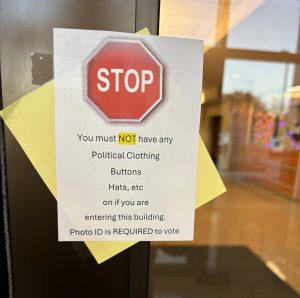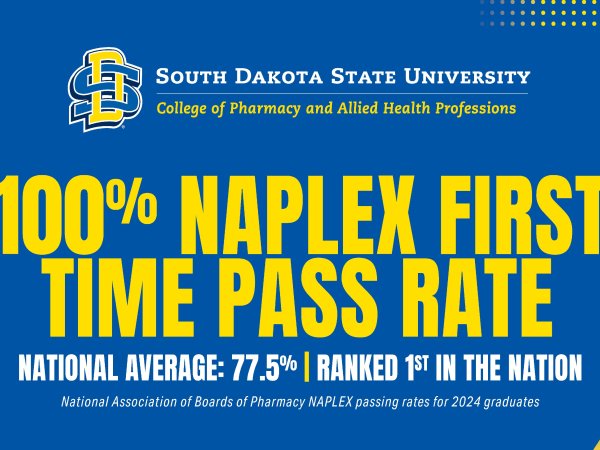
Thousands of South Dakotans will leave their homes and help decide the fate of the country and our state on Nov. 5. Here’s a little bit of what you need to know before then.
County finance officer Lori Schultz is expecting a large voter turnout this year.
“I am expecting a high turnout. Probably [around] 75 – 85 %.” She said, “There are a lot of measures on the ballot this time. People seem to be very polarized between the Presidential Candidates. We started the absentee voting process on Sept. 20 and have had a steady turnout so far.”
Schultz also wants to encourage students to go out there and fulfill their civic duty.
“Every vote counts, even if the candidate that they are backing is facing a huge challenge in their election and the voter feels their vote won’t matter. They need to take part in the electoral process to keep it alive and not just as a voter. It is disheartening for me to see such little interest in positions that are elected, especially at the local level. There are several positions in local government that are elected, including mine (the finance office is a combination of the treasurer and auditor office), the city council, county commission, register of deeds, sheriff, and state attorney. People need to get involved to make change,” Shultz said.
Schultz also wants students to make a change where they can.
“Get involved in the election process by becoming an election worker. Join a political group on campus or in the community, attend City Council and County Commission meetings to see what is happening. Most counties publish their meetings online for people to watch; check out what your commission/council back home is up to.”
Voting registration in South Dakota ended Oct. 21, but you can still contact your county’s auditor and request an absentee ballot.
What to keep in mind when voting in person
You will need proof of ID when voting. Acceptable forms of ID include a South Dakota driver’s license or non-driver ID card, U.S. government photo ID (passport is sufficient), U.S. Armed Forces ID, current student photo identification card from a South Dakota high school or South Dakota accredited institution of higher education or a tribal photo ID.
Political paraphernalia is not allowed within 100 feet of any polling location. That includes shirts, hats and buttons. Shultz said they have already had some problems with this.
“Some have argued, some have taken pictures of the workers, which is also in violation of the law. Just don’t do it. We have excellent election workers in our county that have a lot of experience and do their job well.”
For more information on the local election for Brookings, visit brookingscountysd.gov or vip.sdsos.gov.
BALLOT MEASURES
Amendment E (Gender Neutral Language): This amendment will replace the generalized “he” in our state’s constitution with more gender-neutral language to be more inclusive. The example given on the ballot and the attorney general’s website is that it would change “he shall be commander-in-chief of the armed forces of the state” to “the Governor shall be commander-in-chief of the armed forces of the state.”
Amendment F (Medicaid Work Requirement): According to Attorney General Marty Jackley’s explanation, “ln 2022, the voters approved a Constitutional provision that expanded Medicaid eligibility for any person over age 18 and under 65 whose income is at or below 133% of the federal poverty level, plus 5% of the federal poverty level for the applicable family size.”
This amendment would allow the state to impose a work requirement on anyone who qualifies for this expanded program except for physical or mental disability. It also doesn’t specify what the work requirement would entail, only that the state can legally mandate one.
Amendment G (The Right to Abortion Initiative): This amendment would prohibit the state from making any regulations on abortion for the first trimester of pregnancy. For the second trimester, the state may make regulations, but they “must be reasonably related to the physical health of the pregnant woman.” according to Jackley.
The state can also regulate or prohibit abortion during the third trimester except where the health of the pregnant woman is in jeopardy. According to Jackley, “whether an abortion is necessary during the third trimester must be determined by the pregnant woman’s physician according to the physician’s medical judgment.”
This amendment is unique because both pro and anti-abortion advocates have criticized it.
“Constitutional amendments are serious and expensive undertakings that must be initiated after due diligence and input from those who would be impacted the most.” Tim Stanley, vice president of Planned Parenthood North Central States public affairs, told South Dakota Searchlight in December 2023.
“As the sole abortion provider in South Dakota for more than 30 years, Planned Parenthood is acutely aware of the impact policy language can have on patients’ lives. We stand with our partners at ACLU (American Civil Liberties Union) of South Dakota and do not support the amendment as drafted because we don’t believe it will adequately reinstate the right to abortion in South Dakota.”
Rick Weiland, chairperson of Dakotans for Health, told South Dakota Searchlight that he defends the amendment.
“We’re trying to restore the rights that women have had for the last 50 years. And that’s why we have used the actual language of Roe v. Wade for the amendment.”
Amendment H (Top Two Primary Elections): This amendment would change the current partisan primary system for state elections to an open primary where
all candidates appear on the ballot and all registered voters can participate regardless of party affiliation. This means that during primary voting, all candidates running for Governor, State Legislature, U.S. Senate and House of Representatives, and elected county offices would appear on the same ballot, and the top two of each category would run in the primary election.
Measure 28 (Prohibit Food and Grocery Taxes): This measure would prohibit the state from collecting taxes on anything sold for “human consumption.” This would not include tobacco, alcohol or prepared food, defined as “food that is sold heated or with utensils,” according to Jackley.
Jackley warns that this measure may affect the tobacco master settlement agreement, which makes South Dakota $20 million annually, and the streamlined sales tax agreement. This multi-state program helps simplify the collection of sales tax for companies selling in multiple jurisdictions. Also, “judicial or legislative clarification of the measure will be necessary.”
Measure 29 (Recreational Marijuana): Measure 29 will make it legal for anyone over the age of 21 to possess, grow, purchase and consume Marijuana. Individuals would be allowed to have 2 ounces of unconcentrated Marijuana, 16 grams of concentrated and 1,600mg of THC in marijuana products, according to The Associated Press. People could also grow six plants, with up to 12 plants per household.
Basic user restrictions would apply. Under this measure, you cannot drive while under the influence or possess it in a place where tobacco is prohibited, like at a school, and building owners may restrict use on their properties.
Referred Law 21 (Regulation of Carbon Dioxide Pipelines): This law would allow counties to charge certain pipeline owners who receive a tax credit of $1 per foot of pipe. This would also require a minimum depth for pipelines. According to Jackley, “each pipeline operator is responsible for damages to drain tile and to the surface owner, caused by the pipeline; each operator is also responsible for leaks or failures of the pipeline; and any land agent acting on behalf of the pipeline must be a pipeline employee, State resident, or State licensed real estate agent.”
CANDIDATES
President of the United States
Democrat: Kamala Harris/Tim Walz
Republican: Donald Trump /J.D. Vance
Independent: Robert F. Kennedy Jr./Nicole Shanahan (withdrew but will still be on the ballot)
Libertarian: Chase Oliver/Mike ter Maat
United States House of Representatives
Republican: Dusty Johnson (Incumbent)
Democrat: Sheryl Johnson
South Dakota Public Utilities Commission
Republican: Kristie Fiegan (Incumbent)
Democrat: Forrest Wilson
Libertarian: Gideon Oaks
South Dakota District 7 State Senate
Republican: Tim Reed (Incumbent)
South Dakota District 7 State House of Representatives (two seats available)
Republican: Roger DeGroot (Incumbent)
Republican: Mellissa Heermann (Incumbent)
Democrat: Blake Stevens
Democrat: Fedora Sutton-Butler
South Dakota Supreme Court
Nonpartisan: Scott P. Myren (Incumbent)


















